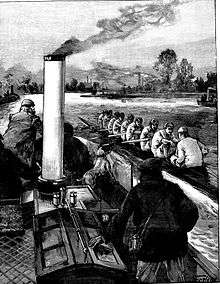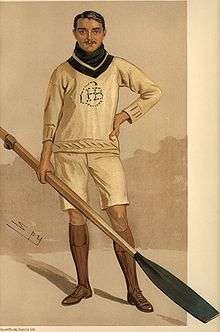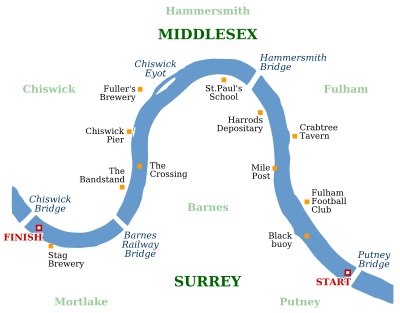The Boat Race 1892
The 49th Boat Race took place on 9 April 1892. The Boat Race is an annual side-by-side rowing race between crews from the Universities of Oxford and Cambridge along the River Thames. Oxford went into the event as reigning champions, having won the previous year's race. In total, twelve of the competitors had previous Boat Race experience. In a race umpired by former rower Frank Willan, Oxford won by 2 1⁄4 lengths in a time of 19 minutes 10 seconds. It was their third consecutive victory and the fastest in the history of the event at that time.
| 49th Boat Race | |||
|---|---|---|---|
 Engraving of Cambridge's Stanley Muttlebury coaching the crew from a steamer | |||
| Date | 9 April 1892 | ||
| Winner | Oxford | ||
| Margin of victory | 2 1⁄4 lengths | ||
| Winning time | 19 minutes 10 seconds | ||
| Overall record (Cambridge–Oxford) | 22–26 | ||
| Umpire | Frank Willan (Oxford) | ||
| |||
Background
The Boat Race is a side-by-side rowing competition between the boat clubs of University of Oxford (sometimes referred to as the "Dark Blues")[1] and the University of Cambridge (sometimes referred to as the "Light Blues").[1] The race was first held in 1829, and since 1845 has taken place on the 4.2-mile (6.8 km) Championship Course on the River Thames in southwest London.[2][3] The rivalry is a major point of honour between the two universities; as of 2014 it is followed throughout the United Kingdom and broadcast worldwide.[4][5][6] Oxford went into the race as reigning champions, having beaten Cambridge by half a length in the previous year's race, and held the overall lead, with 25 victories to Cambridge's 22 (excluding the "dead heat" of 1877).[7][8]
Oxford's coaches were F. P. Bully, R. C. Lehmann (former president of the Cambridge Union Society and captain of the 1st Trinity Boat Club; although he had rowed in the trial eights for Cambridge, he was never selected for the Blue boat)[9] Douglas McLean (who rowed five times for Oxford between 1883 and 1887), and Guy Nickalls (five-time Blue between 1887 and 1891).[10] Lehmann had briefly coached Cambridge in the "early stages" of their preparation.[11]
The umpire for the race for the fourth year in a row was Frank Willan who won the event four consecutive times, rowing for Oxford in the 1866, 1867, 1868 and 1869 races.[12]
Crews
The Oxford crew weighed an average of 12 st 3 lb (77.4 kg), 5.125 pounds (2.3 kg) per rower more than their opponents. Cambridge's crew contained two rowers with no experience in the event, Robert Grieve Neill rowing at number two and Graham Campbell Kerr at number six. Four of their crew attended Trinity Hall. Oxford saw four rowers and the cox return from the previous year's race, and included Guy Nickalls rowing in his fourth consecutive event. Six of the Dark Blues had been pupils at Eton College, and four were studying at Magdalen College.[13] One rower was registered as non-British: Edward Wason Lord for Cambridge hailed from Australia, having attending Brisbane Grammar School.[14]

| Seat | Oxford |
Cambridge | ||||
|---|---|---|---|---|---|---|
| Name | College | Weight | Name | College | Weight | |
| Bow | H. B. Cotton | Magdalen | 9 st 13 lb | E. W. Lord | Trinity Hall | 10 st 12 lb |
| 2 | J. A. Ford | Brasenose | 11 st 9 lb | R. G. Neill | Jesus | 11 st 11 lb |
| 3 | W. A. S. Hewett | University | 12 st 2 lb | G. Francklyn | 3rd Trinity | 12 st 3 lb |
| 4 | F. E. Robeson | Merton | 13 st 7.5 lb | E. T. Fison | Corpus Christi | 12 st 6.5 lb |
| 5 | V. Nickalls | Magdalen | 13 st 1 lb | W. Landale | Trinity Hall | 13 st 1 lb |
| 6 | W. A. L. Fletcher | Magdalen | 13 st 8 lb | G. C. Kerr | 1st Trinity | 12 st 1 lb |
| 7 | R. P. P. Rowe (P) | Magdalen | 13 st 2 lb | C. T. Fogg-Elliot | Trinity Hall | 11 st 8.5 lb |
| Stroke | C. M. Pitman | New College | 11 st 12 lb | G. Elin | 3rd Trinity | 10 st 10 lb |
| Cox | J. P. Heywood-Lonsdale | New College | 8 st 9 lb | J. V. Braddon | Trinity Hall | 7 st 13 lb |
| Source:[15] (P) – boat club president, John Friend Rowlatt acted as Cambridge's non-rowing president[16] | ||||||
Race

Oxford won the toss and elected to start from the Middlesex station, handing the Surrey side of the river to Cambridge,[13] the pre-race favourites (although former rower and author George Drinkwater states this was as a result of a practice row after which Oxford's time was inaccurately reported in the press). Conditions for the race were described by Drinkwater as "perfect" with a light breeze from the east and a good tide.[11] Oxford led from the start and were half a length ahead by Craven Steps (approximately 1,080 yards (990 m) along the course), extending to almost a length at Harrods Furniture Depository. A spurt from Cambridge's stroke Gerard Elin reduced the deficit and by Hammersmith Bridge they were half a length down.[11]
A malfunctioning slide rendered Elin's contributions to the Light Blues' efforts negligible and Oxford accelerated away, being two lengths up by Chiswick and four lengths ahead as they passed under Barnes Bridge.[11] They passed the finishing post 2 1⁄4 lengths ahead in a time of 19 minutes and 10 seconds. It was Oxford's third consecutive victory, and was the fastest winning time in the history of the race (when held on the Championship Course), beating the 1873 race winning time by 25 seconds.[8]
References
Notes
- "Dark Blues aim to punch above their weight". The Observer. 6 April 2003. Retrieved 11 September 2014.
- Smith, Oliver (25 March 2014). "University Boat Race 2014: spectators' guide". The Daily Telegraph. Retrieved 20 August 2014.
- "The Course". The Boat Race Company Limited. Retrieved 20 August 2014.
- "Former Winnipegger in winning Oxford–Cambridge Boat Race crew". CBC News. 6 April 2014. Retrieved 20 August 2014.
- "TV and radio". The Boat Race Company Limited. Retrieved 5 July 2014.
- Markovits, Andrei; Rensmann, Lars (6 June 2010). Gaming the World: How Sports Are Reshaping Global Politics and Culture. Princeton University Press. pp. 287–288. ISBN 978-0-69-113751-3.
- "Classic moments – the 1877 dead heat". The Boat Race Company Limited. Archived from the original on 28 October 2014. Retrieved 11 November 2014.
- "Men – Results". The Boat Race Company Limited. Retrieved 27 September 2014.
- Searby, Peter (6 November 1997). A History of the University of Cambridge: Volume 3, 1750–1870. Cambridge University Press. p. 664. ISBN 978-0-52-135060-0.
- Burnell, pp. 110–111
- Drinkwater, p. 97
- Burnell, pp. 49, 59
- Burnell, p. 65
- Burnell, p. 38
- Dodd, p. 310
- Burnell, pp. 50–51
Bibliography
- Burnell, Richard (1979). One Hundred and Fifty Years of the Oxford and Cambridge Boat Race. Precision Press. ISBN 978-0-95-006387-4.
- Dodd, Christopher (1983). The Oxford & Cambridge Boat Race. Stanley Paul. ISBN 978-0-09-151340-5.
- Drinkwater, G. C.; Sanders, T. R. B. (1929). The University Boat Race – Official Centenary History. Cassell & Company, Ltd.

